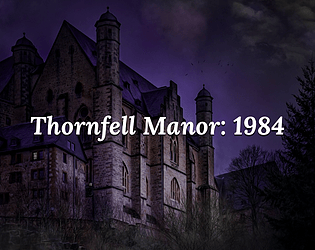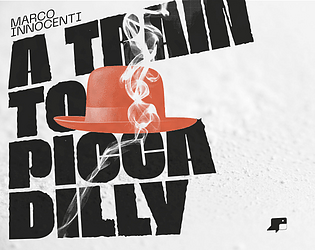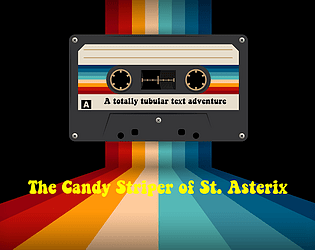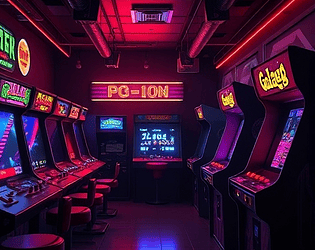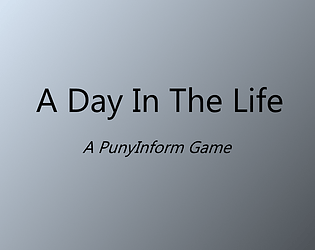
This jam is now over. It ran from 2024-11-30 23:00:00 to 2024-12-29 22:59:59. View 6 entries
Introduction
Feeling nostalgic about the golden age of text adventures? Relive those days by participating in PunyComp 2024!
This is a competition where you write a text adventure using PunyInform.
Theme
All games submitted must, completely or in part, be set sometime in the years 1977-1989.
Schedule
| 1 December | The competition opens for submissions. |
|---|---|
| 29 December | The last day to submit a game |
| 30 December | Voting period begins |
| 19 January | Last day to vote |
Results
| Game | Author | Overall rating | # Writing | # Puzzles |
| 1. The Candy Striper of St. Asterix | improvmonster | 7.67 | 2 | 1 |
| 2. A Train to Piccadilly | Marco Innocenti | 7.50 | 1 | 2 |
| 2. Thornfell Manor: 1984 | tkers | 7.50 | 5 | 3 |
| 4. Late Night at the Mall | johanberntsson | 7.18 | 3 | 4 |
| 5. Mars, 2049 AD | fredrikr | 6.67 | 4 | 5 |
| 6. A Day in the Life - A Puny Inform Game | Grub Studios | 4.20 | 6 | 6 |
How do I use PunyInform?
You write your game in an object oriented programming language on a modern PC (typically running Windows, MacOS or Linux). The programming language is called Inform 6, and the library used is called PunyInform. This library contains (among other things) an advanced parser, a world model and definitions for common verbs.
You load up a template for an empty game, and start adding your own locations, objects, new verbs, replies and behaviours. You compile your game to a Z-code file, which can then be made playable both online and on pretty much any computer from the eighties and on, right up to modern PCs. There is no support for graphics: only text.
Learn more at the PunyInform site . There's also a Discord server where you can get support.
Voting
Anyone can be a judge. Authors are not allowed to vote on their own games, or try to influence the voting of others. Voting is done using Google Forms . A judge has to vote on at least three different games, for their votes to count.
Judges are asked to play each game for no more than 60 minutes before deciding how to vote. Judges will be asked to rate each game on these aspects:
* Overall Enjoyment
* Writing [Optional]
* Puzzles [Optional]
* Playability on 8-bit computers [Optional]
Voting link (Google Forms): (CLOSED)
Rules
- The game must be written with PunyInform.
- The competition version of the game must be free to play, during and after the competition. The author may not demand or suggest that players pay anything to play it. The author may release new versions after the competition, without any such restrictions.
- The game must not have been released before. A remake of an older game is allowed, if the original game wasn't built in Inform 5 or 6, and no derived versions built in Inform 5 or 6 have been released either. A remake of someone else's game requires the explicit permission of the original author.
- The game must be in English.
- The game content must adhere to the theme.
- The game must not contain any copyrighted material that the entrant does not have the rights to use.
- Entrants may share their source code or compiled versions of their game with other people during the entire competition. They may not publish compiled versions of the game publicly before voting starts.
- Entrants may modify their games during the voting period, but must not add new locations to these modified versions. If players see a new location (such as a new room, or enterable object), the game can be disqualified.
- Entrants must be respectful to the competition organizers, other participants, people voting and discussing the games etc.
- Entrants may not in any way try to make other people vote on any specific game, or to give any game a higher or lower rating than it deserves.
- The game must not contain any hateful, racist, misogynist or homophobic content, or any content that’s intended to make any group of people feel bad about themselves.
- The competition organizers reserve the right to remove a game from the competition, or to require the entrant to remove certain content.
- Judges will be asked to rate the overall enjoyment they got out of the game. This determines the final ranking.
- Entrants may be judges, but must not vote on their own game.
- The competition organizers may enter their own games in the competition.
- Entrants are not allowed to publicly review or rate their or others’ games before the end of the voting period.
Recommendations
We strongly encourage entrants to:
- aim to make a game that's small, complete and well tested
- cooperate, share code, help each other out with design, programming, testing etc
- publish their source code so others can see how everything is done
- consider what, if anything, they want to use AI for - while AI tools may help with translating words and sentences for authors whose first language isn't English, using AI to generate full pargraphs of text has been known to produce bland prose, not all that suitable for text adventures
- expect learning PunyInform to take some time. The system is powerful, but comes with a learning curve!
- publish a way that they can be contacted for feedback for their game
Again, we can't stress this enough: You need to have your game thoroughly tested by others who have previous experience of text adventures. Listen to their feedback and use it to make the game better. If the testers can't figure out how to solve a puzzle, maybe you need to make it easier. If the testers think it makes sense to use a certain verb in a situation, consider adding it, either as a new way to solve a puzzle, or to get a clue how to solve the puzzle, or just get a tailor-made response to show that you've thought of it and recognize it's a sensible thing to try.
We strongly encourage judges to:
- play as many of the games as they can (if they rate less than three games, their votes won't be counted)
- play all the games they intend to play, before submitting their votes
- keep a score card with rating and opinions for each game, so they won't accidentally mix up the games when casting their votes (We've seen it happen!)
- write down some comments about each game they play - something they liked, something they think can be improved etc - and send it to the author. There is an option to include feedback in the voting form, or you can contact the author directly.
Platforms
As a bare minimum, the games have to be supplied in Z-code format, e.g. mygame.z3 or mygame.z5.
We recommend entrants make the game playable online. Everyone can do this at https://borogove.io/ .
Entrants may also supply the game in formats playable on retro platforms, perhaps by using https://ozmoo.online/ to build disk images for Commodore or Acorn computers. Some judges find the opportunity to play new games on vintage hardware exciting, so you should make sure your game runs well on these old machines.
Resources
There's a series of tutorials for PunyInform under "Articles" on the PunyInform home page.
Intfiction.org has a lively forum with lots of skilled and helpful people. This is a good place to get advice on text adventure authoring, on development systems, and a place to get beta-testers. Questions that relate to PunyInform development are typically posted in Authoring | Inform 6, with a PunyInform tag.
There is a PunyInform Discord server, where you can get technical support, talk about plot and story, or just hang out and chat.
Prizes
Prize money donations are gathered into a pool, and distributed as follows, based solely on the average rating for "Overall Enjoyment":
1st prize: 35%
2nd prize: 23%
3rd prize: 17%
4th prize: 14%
5th prize: 11%
Prizes are payable as either PayPal transactions or Steam gift cards.
The prize money pool currently holds USD $150, ($100 donated by Fredrik Ramsberg and Johan Berntsson, $50 donated by Gianluca Girelli).
Contact us if you want to contribute. See contact details under "Organizers."
FAQ
Q: What's special about the years 1977-1989?
A: We think of this as the Infocom era. The first version of Zork was made available to others in 1977. Infocom as a company published their last games in 1989.
Organizers
The organizers of this competition are Fredrik Ramsberg, Johan Berntsson, and Henrik Åsman. You can reach us at punycomp2024@microheaven.com
Submissions(6)
No submissions match your filter


